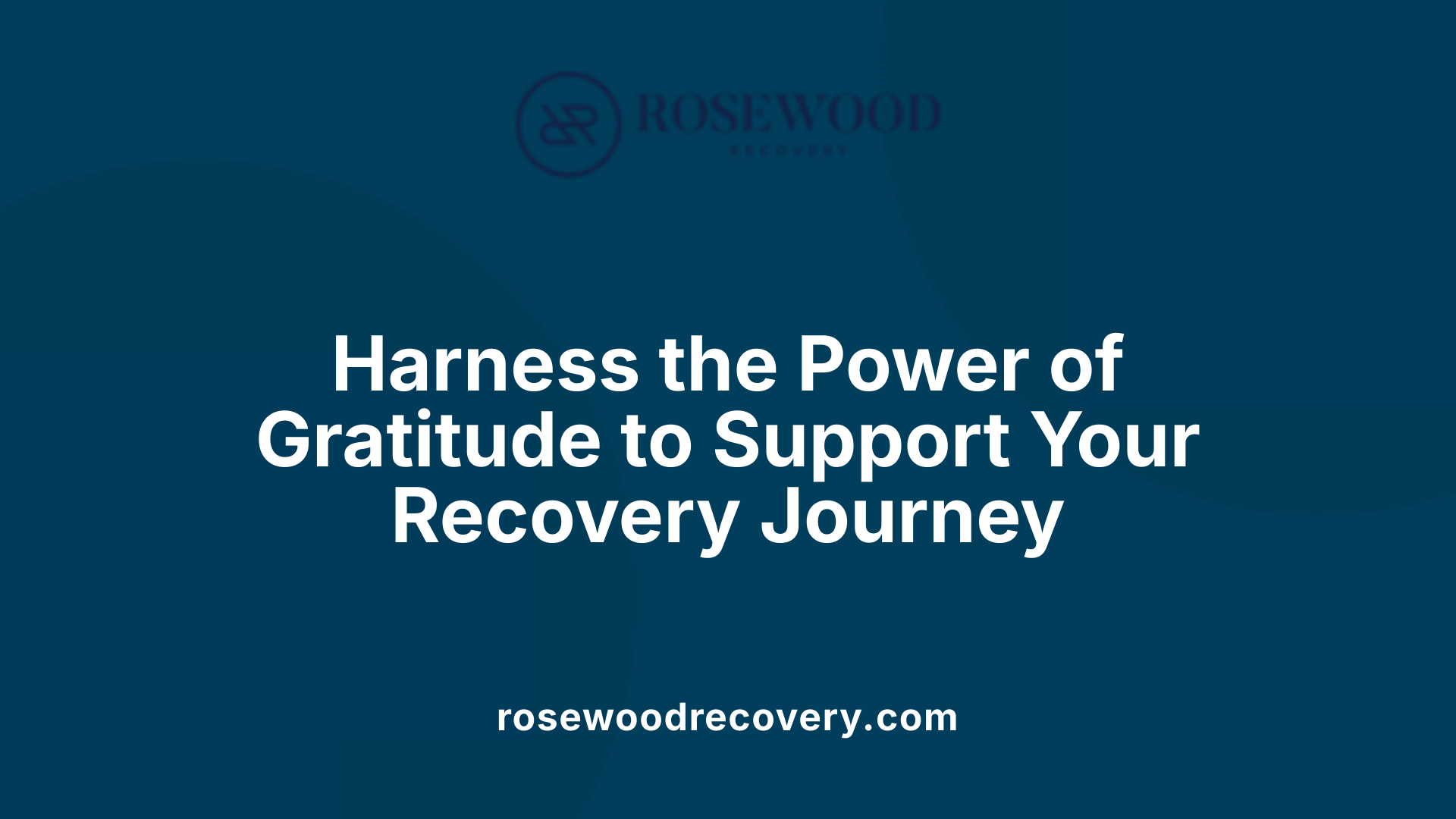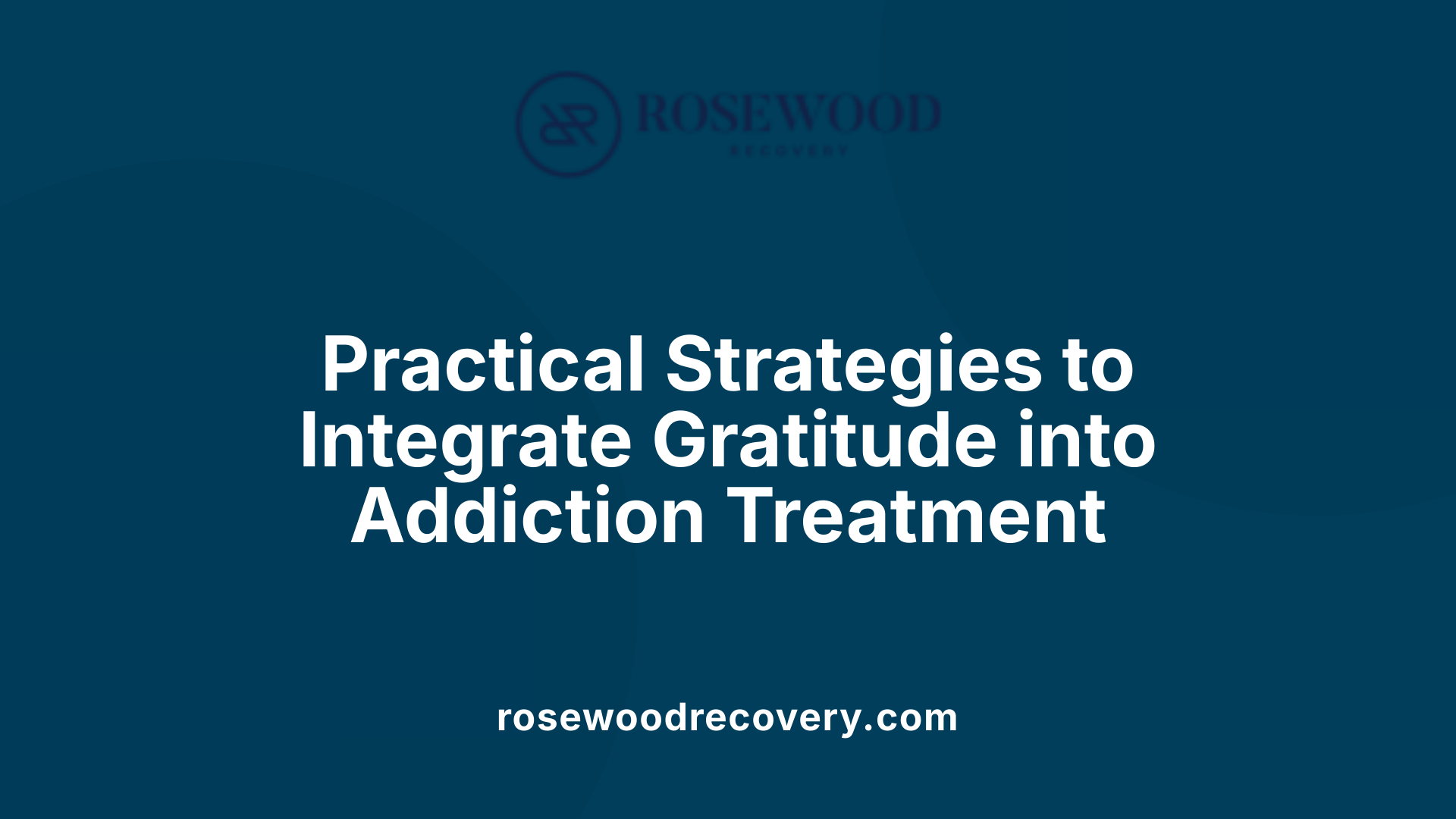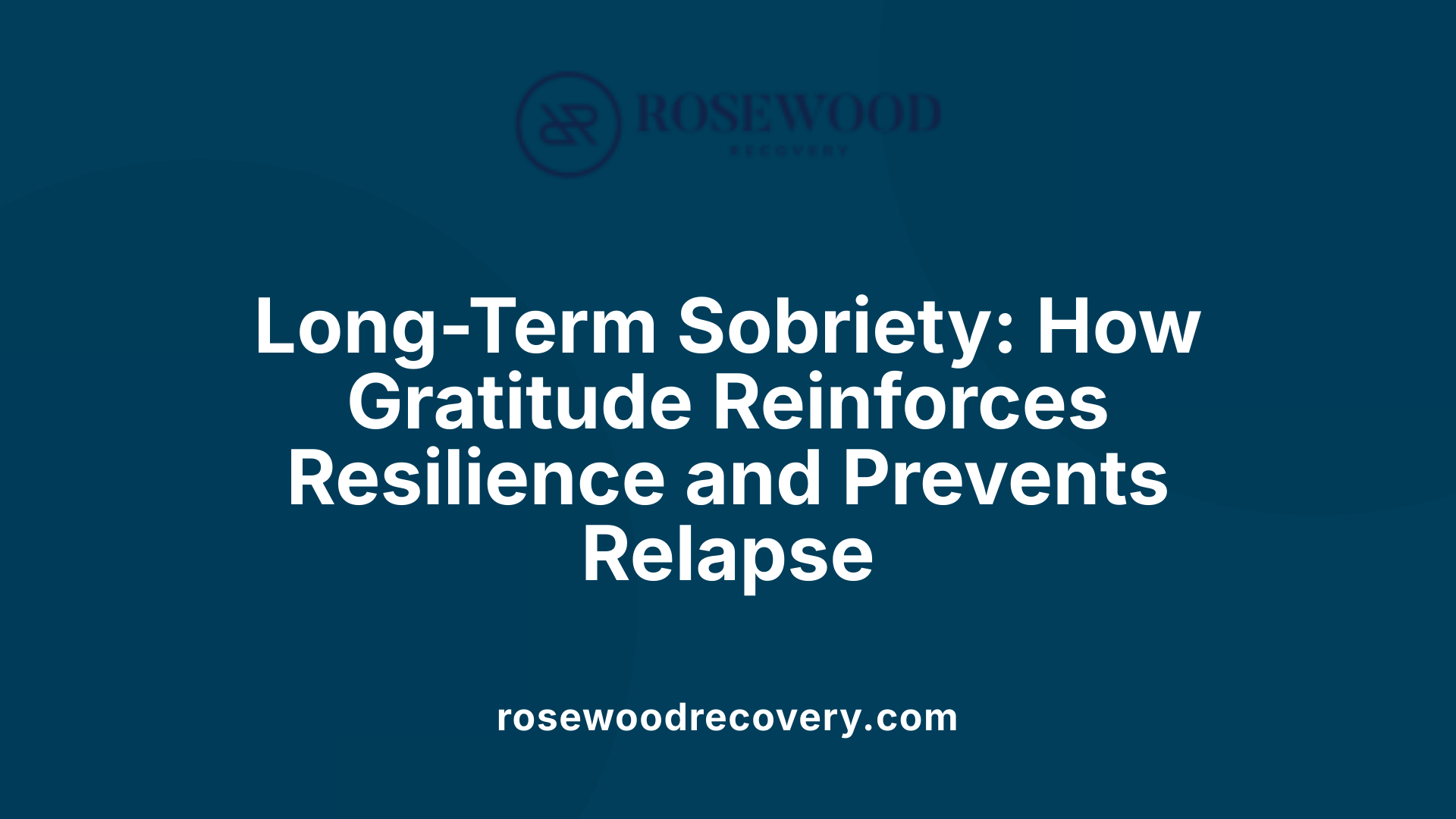An Essential Element in Addiction Recovery
In addiction treatment, the journey to sobriety often involves overcoming physical, emotional, and social hurdles. While therapies and medications are vital, cultivating a sense of gratitude emerges as a powerful, evidence-based tool that enriches the recovery process. Practicing gratitude supports mental health, fosters resilient social bonds, and promotes sustainable sobriety. This article explores the multifaceted benefits of integrating gratitude into addiction treatment, backed by scientific research and practical strategies.
Understanding the Role of Gratitude in Recovery

Why is practicing gratitude important during addiction recovery?
Practicing gratitude plays a crucial part in addiction recovery by helping individuals reframe their mindset from negativity to positivity. Recovery often involves facing setbacks, negative emotions, and self-doubt. Gratitude encourages focusing on what has been achieved and the support systems available, which can boost motivation and emotional resilience.
Engaging in regular gratitude practices, like keeping a gratitude journal or expressing thanks, helps reduce feelings of stress, anxiety, and depression. These negative emotions are common triggers for relapse, so managing them is vital. Gratitude enhances mental well-being by fostering positive emotions and helping individuals recognize their progress.
Furthermore, gratitude supports physical health by improving sleep quality, lowering blood pressure, and strengthening the immune system. It also fosters better social relationships—trust, empathy, and forgiveness—making it easier to rebuild connections damaged by addiction.
Overall, cultivating gratitude provides a foundation of hope and purpose, empowering individuals to stay committed on their recovery journey. It aids in managing emotional and physical challenges, creating a more optimistic outlook, and reinforcing their motivation to maintain sobriety during difficult times.
Psychological, Emotional, and Social Benefits of Gratitude

What are the psychological, emotional, and social benefits of practicing gratitude in addiction treatment?
Practicing gratitude provides a wide range of benefits that are especially valuable during addiction recovery. Mentally, gratitude helps elevate overall happiness and emotional well-being. It fosters positive emotions such as joy, hope, and optimism while simultaneously reducing stress, anxiety, and negative thought patterns like catastrophizing or shame.
Emotionally, gratitude encourages individuals to shift their focus from feelings of guilt, regret, or resentment toward appreciation and contentment. This shift can significantly boost self-esteem and cultivate hope for the future, creating a more resilient and positive outlook on life's challenges.
On a social level, gratitude activities such as expressing thanks, writing gratitude lists, or engaging in acts of kindness can strengthen relationships. They foster trust, empathy, and understanding, which are crucial in repairing damaged bonds with friends and family. These strengthened connections not only provide emotional support but also expand social networks, offering a sense of belonging and community that is essential during recovery.
Furthermore, gratitude promotes prosocial behaviors that benefit both the individual and their social environment. It encourages a less selfish perspective, inspiring generosity and helping others, which can further reinforce positive social bonds.
Research indicates that individuals who regularly practice gratitude experience improved mental health, greater social support, and a more hopeful outlook. This combination of psychological, emotional, and social improvements supports long-term sobriety by increasing resilience, motivation, and the capacity to handle setbacks.
In summary, gratitude acts as a powerful catalyst in addiction treatment, nurturing a positive mental state, strengthening personal relationships, and fostering a supportive community—all vital elements for sustained recovery.
Mental Health Improvements Through Gratitude Practices
How can practicing gratitude improve mental health during recovery?
Practicing gratitude offers remarkable benefits for mental health, especially during addiction recovery. It helps reduce common emotional challenges such as stress, anxiety, and depression by shifting focus from negative thoughts to positive aspects of life. Engaging in simple activities like keeping a gratitude journal, writing thank-you notes, or reflecting on daily blessings can reframe thinking patterns that tend toward rumination and self-criticism.
This positive reframing fosters emotional regulation, making it easier to cope with setbacks or cravings. Gratitude encourages an optimistic outlook by highlighting progress and support, which bolsters motivation and perseverance. Moreover, expressing gratitude deepens social bonds, building trust, empathy, and a sense of belonging—elements vital to long-term sobriety.
From a neuroscientific perspective, gratitude activates the brain's reward systems, releasing dopamine and other feel-good neurotransmitters. This activity enhances feelings of pleasure, contentment, and well-being. Neuroimaging studies reveal that practicing gratitude strengthens neural pathways associated with positive emotion and social connection, making resilience more accessible during recovery.
Research emphasizes that regular gratitude exercises, such as mindfulness and gratitude lists, contribute to lower cortisol levels, improved sleep, and enhanced immune function. These physical health benefits further support mental stability, creating an overall environment conducive to recovery.
In summary, gratitude is a powerful, evidence-backed tool that improves mental health by fostering emotional regulation, promoting positive thinking, and activating neural circuits linked to happiness. Its role in recovery sustains hope, strengthens social support, and encourages a mindset focused on growth rather than setbacks, vital for overcoming addiction and cultivating well-being.
Implementing Gratitude in Treatment Settings

What are some practical ways to incorporate gratitude into addiction treatment?
Integrating gratitude practices into addiction treatment is a proven way to support recovery and foster emotional resilience. One common method is maintaining a gratitude journal, where individuals regularly record what they are thankful for—be it supportive relationships, personal strengths, or simple daily pleasures. This habit helps shift focus from cravings or setbacks to positive aspects of life, reinforcing motivation.
Expressing thanks to others is another effective technique. Writing thank-you notes to friends, family, or treatment staff can rebuild trust and deepen social bonds, which are crucial during recovery. Verbal appreciation during therapy or support group meetings fosters a sense of community and shared purpose.
Mindfulness exercises centered on gratitude also play a significant role. Guided meditations that focus on feelings of thankfulness can calm the mind, reduce stress, and improve emotional regulation. These practices cultivate present-moment awareness and help individuals manage negative emotions like guilt or shame.
Support groups such as Alcoholics Anonymous (AA) incorporate gratitude activities regularly. Sharing expressions of thankfulness for sobriety milestones or support received encourages a collective positive outlook and reinforces commitment.
Creative approaches, including making gratitude lists or engaging in acts of service, can elevate mental health. For example, creating visual gratitude boards or art projects allows individuals to express their appreciation creatively, reinforcing positive thinking.
Involving therapy sessions in gratitude-focused discussions encourages reflection on personal growth and achievements. This perspective shifts attention from past mistakes to future possibilities, promoting hope.
By actively adopting these gratitude practices, individuals in recovery enhance their emotional stability, foster supportive relationships, and strengthen their commitment to sobriety. The consistent integration of gratitude into treatment routines not only improves mental health but also builds resilience against relapse and setbacks.
Long-Term Benefits of Gratitude and Evidence Supporting Its Use

What are the benefits of gratitude for long-term sobriety and relapse prevention?
Practicing gratitude is essential for maintaining long-term sobriety. It helps individuals develop emotional resilience, which is crucial when facing ongoing challenges and the risk of relapse. By focusing on what they are thankful for, recovering persons can shift their mindset from negativity, guilt, or shame to one of appreciation and hope. This shift fosters a positive mental outlook and boosts confidence in their ability to stay sober.
Gratitude also reduces stress, which is a common trigger for relapse. It encourages a focus on positive life aspects, progress made, and supportive relationships, reinforcing motivation to continue recovery. Moreover, expressing gratitude enhances social bonds by increasing feelings of empathy and trust, helping individuals rebuild damaged relationships or establish new healthy connections.
On a neurological level, gratitude activates brain pathways associated with reward and pleasure, releasing chemicals such as dopamine and serotonin. These neurotransmitters elevate mood and help diminish cravings, making it easier to sustain sobriety.
Overall, cultivating gratitude cultivates a resilient, optimistic attitude that promotes long-term sobriety by counteracting negative thought patterns and fostering a supportive, hopeful outlook.
What is the scientific evidence supporting gratitude's positive effects on physical and mental health?
Research robustly supports the physical and mental health benefits of regular gratitude practice. People who maintain gratitude journals or lists report better sleep, lower blood pressure, and a stronger immune system. They experience fewer aches and pains and show improvements in overall physical well-being.
Mentally, gratitude correlates with increased positive emotions such as joy, hope, and contentment. It reduces symptoms of depression, anxiety, and stress—all of which are prevalent in those recovering from addiction.
Neuroscientific studies reveal that gratitude activates neural pathways related to reward and social bonding. These pathways release dopamine, reinforcing positive thoughts and behaviors, and help rewire the brain for more optimistic patterns.
Social benefits include increased helpfulness, generosity, and forgiveness, fostering healthier relationships—an important aspect of recovery support networks.
Are there programs or case examples that successfully integrate gratitude practices?
Yes, many recovery programs incorporate gratitude exercises to support healing. For example, Alcoholics Anonymous (AA) emphasizes gratitude as part of the tenth step, encouraging members to reflect on their blessings regularly. This activity helps reinforce their commitment and fosters community support.
Programs like Omnia Recovery incorporate gratitude practices in therapy sessions, urging clients to keep gratitude journals, write thank-you notes, and engage in group gratitude sharing. These activities promote self-esteem, purpose, and stronger relationships.
Research indicates that structured gratitude exercises—such as gratitude journals, gratitude letters, or gratitude jars—are linked to increased happiness, resilience, and overall well-being. This not only supports mental health but also sustains motivation during the long recovery journey.
| Program/Approach | Key Practice | Outcomes | Additional Notes |
|---|---|---|---|
| Alcoholics Anonymous (AA) | Reflection on blessings, gratitude step | Rebuilding trust, motivation | Integral to spiritual and community aspects of recovery |
| Omnia Recovery | Journaling, group sharing, gratitude exercises | Improved self-esteem, emotional strength | Incorporates daily gratitude to support long-term sobriety |
| Gratitude journaling techniques | Daily list making, gratitude tracking | Long-lasting positive mood | Promotes neuroplasticity toward positive thinking |
In summary, integrating gratitude into recovery routines is supported by extensive scientific research and successful program models. It offers lasting physical, emotional, and social benefits that bolster long-term sobriety and diminish relapse risk.
Embracing Gratitude for a Brighter Future
The integration of gratitude into addiction treatment is not merely a complementary practice but a foundational element that offers profound psychological, emotional, and physical benefits. Scientific research underscores how gratitude enhances mental health, fortifies social bonds, and supports sustained sobriety. By fostering a positive outlook, promoting emotional resilience, and strengthening relationships, gratitude empowers individuals to navigate recovery with hope, confidence, and lasting motivation. Incorporating simple, daily gratitude practices—such as journaling, expressing thanks, or acts of kindness—can transform the recovery journey into one characterized by positivity and purpose. Embracing gratitude robustly supports the pursuit of a healthier, more fulfilling future, making it an indispensable tool in addiction treatment.
References
- Gratitude in Early Addiction Recovery | Hazelden Betty Ford
- Importance and Benefits of Gratitude in Addiction Recovery
- Overcoming Substance Abuse with Gratitude - Maryland Recovery
- How to Maintain an Attitude of Gratitude During Recovery
- Understanding the Importance and Benefits of Gratitude in Addiction ...
- How to Practice Gratitude in Addiction Recovery
- The Importance of Gratitude in Recovery - Ashley Addiction Treatment
- Cultivating Gratitude in Addiction Recovery
- The Benefits and Importance of Gratitude in Addiction Recovery
- Showing Gratitude in Addiction Recovery - Lifeskills South Florida

.jpeg)
.jpeg)

